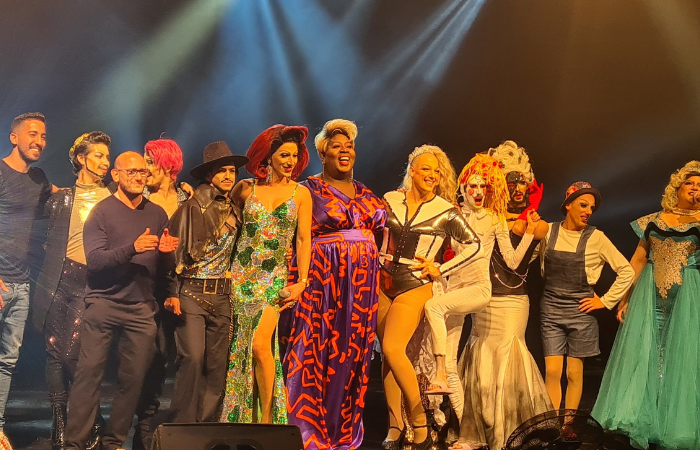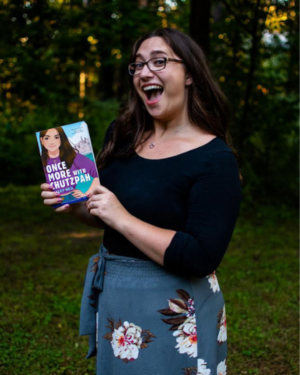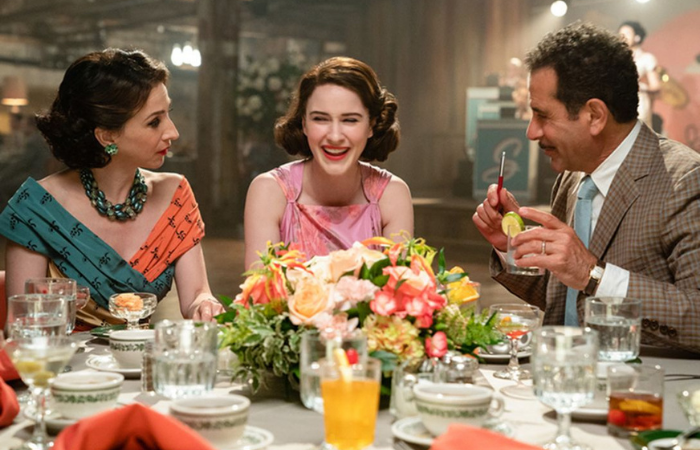Arts
Television
Anti-Jewish Bias Is Spreading in Arts and Culture
There is little doubt that antisemitism in America has intensified recently. In the world of arts and culture, it may be more subtle than a scrawled swastika or a torched synagogue, but anti-Jewish bias in that realm is nonetheless a growing phenomenon.
This bias plays out in multiple ways, according to those looking at culture through a Jewish lens. One of the most recognizable is the marginalization—even demonization—of Israel, with Israeli narratives and artists who perform in Israel targeted by cultural boycotts. At the same time, debate persists among academics and media industry professionals about the degree to which Jews and Jewish stories are excluded from current diversity conversations.
Controversies around Israel “happen every year,” observed Shayna Weiss, the associate director of Brandeis University’s Schusterman Center for Israel Studies and a scholar of Jews in popular culture. “I think we see it more now because it’s easier to find these things online.”

A prime example is the anti-Israel Boycott, Divestment and Sanctions movement (BDS), in whose name pro-Palestinian activists have bullied entertainers who perform in Israel for years. Yet today, we watch the back-and-forth in real time on social media platforms that weren’t as popular, or weren’t around, back when the movement first emerged in the early 2000s. Announcements of a November concert in Israel by will.i.am of the Black Eyed Peas were met with instant boycott calls on Facebook and Twitter. And last July, singer/songwriter Billie Eilish’s Instagram account was targeted by antisemitic trolls after she promoted the launch in Israel of her album Happier Than Ever.
Social media has amplified other recent dustups, including popular Irish author Sally Rooney’s refusal to allow an Israeli publisher to translate her latest novel, Beautiful World, Where Are You, into Hebrew; comedian Sarah Silverman calling out “Jewface,” a neologism to describe non-Jewish actors playing Jewish roles, in a September podcast; and in spring 2021, the Society of Children’s Book Writers and Illustrators issuing, and then apologizing for, a statement that condemned antisemitism.
The entertainment community for the most part is very liberal. And on the left, unfortunately, if you support Israel, you’re being pushed out of those spaces,” said Ari Ingel, director of Creative Community for Peace, a nonprofit arts industry group that combats antisemitism, specifically the cultural boycott of Israel.
Ingel is among those who bemoan a progressive tendency to critique Israel’s complex, multicultural society in terms of America’s charged racial paradigm—“white oppressors, brown victims,” he said, with Israeli Jews cast as the oppressors. “It has been lumped into: If you’re a Zionist, that means you’re a colonizer. When you have Israel labeled a genocidal state and 90 percent of Jews in America support Israel, then all of a sudden Jews support genocide.” At a time when racial issues dominate American discourse, this perception has led to the increase in anti-Jewish sentiment.
“We’ve seen these views emanate online from influencers in the entertainment community,” Ingel added. In 2020, rapper Ice Cube tweeted antisemitic images of a mural with large-nosed men playing Monopoly on the backs of Black people. The same year, Nick Cannon, host of the reality competition show The Masked Singer, shared classic antisemitic conspiracy theories on his podcast, asking why “we give so much power to the ‘theys,’ and ‘theys’ turn into Illuminati, the Zionists, the Rothschilds.”
In response, ViacomCBS canceled Cannon’s improv comedy television show, Wild N’ Out. The entertainer apologized and engaged in dialogue with the Jewish community. His show is now back on the air.
Ingel said his organization provides “balance” to what is often a strongly anti-Jewish discourse, supporting entertainers and sports figures who work in Israel. Last October, the group published an open letter protesting a boycott of TLVFest, the annual Tel Aviv International LGBTQ+ Film Festival. The 200 entertainment industry signatories included actors Neil Patrick Harris, Billy Porter and Helen Mirren (who, for her upcoming film role as Israeli prime minister Golda Meir, has been showered with antisemitic hate online). And nearly 50,000 artists have signed the group’s online petition against the cultural boycott of Israel since 2012, when Creative Community for Peace was founded by David Renzer, then CEO of Universal Music Publishing Group, and Steve Schnur, who heads the music division of Electronic Arts, the world’s largest video game company.

Such high-profile signatories “demonstrate to the public that there’s still broad-based support for understanding and dialogue,” Ingel noted. “Where politics can be so divisive, arts, sports and music can really bring people together.”
Some observers like Weiss, the Brandeis scholar, suggest that BDS and its offshoots may be louder than they are successful. “Israeli culture has unprecedented amounts of money and attention,” said Weiss, citing Israeli shows that have become international hits—Tehran, Fauda and Shtisel among them—as well as the many Israeli series optioned for American remakes. “Money talks, and there’s a lot of money to be made working with Israeli films and television.
“It’s easy to freak out about Sally Rooney, but that is one book versus thousands that are translated into Hebrew every year,” Weiss continued. “The internet loves outrage, but these things have to be taken in context.”
In a different sector of the arts world, anti-Israel sentiment sparked internet outrage last June when the Society of Children’s Book Writers and Illustrators, one of the largest international children’s literature organizations, apologized to its Palestinian and Muslim members after they objected to a post declaring that Jews should have the “right to life, safety, and freedom from scapegoating and fear.” The original statement was posted on Facebook in response to a surge in antisemitic violence in the United States; it asked readers to join “in speaking out against all forms of hate, including antisemitism,” and made no mention of Israel or its war with Hamas that same spring. Even so, pro-Palestinian members of the society complained that the “painful” lack of a parallel denunciation of Islamophobia amounted to taking sides in the Israeli-Palestinian conflict—an argument that caught the attention of the children’s literature community on Twitter and Facebook.
READ MORE: Battling Antisemitism on Campus
Several weeks later, Lin Oliver, the society’s executive director, apologized on Facebook to everyone in the “Palestinian community who felt unrepresented, silenced, or marginalized.” (The society declined repeated requests for comment.) The controversy led to the resignation of the society’s chief equity and inclusion officer, April Powers, who is Black and Jewish. It also prompted many Jewish writers to voice discontent over their exclusion from industry diversity conversations and heightened their concerns about being targeted on social media.
Heidi Rabinowitz, a past president of the Association of Jewish Libraries, said this marginalization occurs because Jews, who are historically well represented in cultural industries, “are seen as having enough privilege and power that they don’t need support. It is unconscious—people aren’t walking around, for the most part, with swastikas—but I absolutely think it’s antisemitism.”
What Jewish authors notice in particular, Rabinowitz said, is that they are excluded from minority grants and diversity programs, such as the ones run by the society, and that they are frequently harassed online. Authors also have complained that mainstream publishers reject Jewish- and Israel-themed books, a topic often discussed in the Jewish Kidlit Mavens Facebook group that Rabinowitz administers with Susan Kusel.
“Frankly, we feel gaslit,” said Kusel, a member of the society whose most recent book is The Passover Guest. Jews are not being included in the diversity conversations, she believes, because their non-Jewish colleagues feel that “Jews do not need the boost. At the same time, we’re being persecuted as a minority.”

Even before her debut young adult novel, Once More with Chutzpah, was published, writer Haley Neil confronted a torrent of online hatred for her story of a girl grappling with Jewish identity on a trip through Israel, which she based on her experiences growing up Jewish in an interfaith home. “This book supports genocide” is typical of many antisemitic comments Neil found about her book on Goodreads, a major online book platform that features early reviews of upcoming titles. “I worried my book would never reach an audience, because people who haven’t read it made false accusations about its contents,” Neil said of the novel, due out this February.
“The increasing focus on diversity in the kidlit space is wonderful,” said Tzivia MacLeod, a Canadian-Israeli author who has won awards from PJ Library (which published two of her titles) and is a regional adviser for the Israeli chapter of the society. “But it has created questions and resentment for authors.” Jews, she said, “need to start demanding a place at the [diversity] table for our own unique and underrepresented background, whether from North Africa, the Middle East or Europe.”
Tensions around presence and visibility complicate issues like “Jewface,” according to Shaina Hammerman, associate director at Stanford University’s Taube Center for Jewish Studies. With its reference to the history of white entertainers putting on blackface, Jewface refers not only to non-Jews cast as Jewish characters, but also to particular mannerisms or references that are uncomfortably close to ethnic caricature—roles “where Jewishness is front and center,” the Jewish comedian Sarah Silverman said, addressing the topic in the much-debated September episode of The Sarah Silverman Podcast.
The Jewface complaint also highlights how frequently non-Jews are cast in high-profile Jewish roles—especially those involving conventionally attractive or refined characters, like Midge Maisel and her parents in the Amazon series The Marvelous Mrs. Maisel, or historically important figures, like Helen Mirren as the titular character in an upcoming biopic of Golda Meir or Felicity Jones as Supreme Court Justice Ruth Bader Ginsburg in the film On the Basis of Sex.

In his recent book Jews Don’t Count: How Identity Politics Failed One Particular Identity, which discusses anti-Jewish bias in media and culture, British television personality David Baddiel calls the issues around Jewface a “passive” antisemitism.
“Look for the absence: the absence, in this case, of concern” and outrage in the public discourse, he writes, when non-Jewish actors play Jewish characters.
Indeed, on her podcast, Silverman insisted she was not calling for change so much as pointing out an uncomfortable double standard: Authentic representation is now de rigueur for virtually every minority group but Jews. Unlike other minority groups, however, Jewish actors have found work playing a range of characters.
“It’s been really important to make sure that a Native American plays a Native American character, or that an Asian play an Asian, because otherwise, historically, they weren’t getting jobs,” Hammerman, of the Taube Center for Jewish Studies, noted. “But Jewish actors are cast all the time to play non-Jews.”
In Hammerman’s view, how a Jewish character is written—as “a rich and interesting human”—is more critical than who plays the role. The larger question, she added, is how to ensure that Jews and antisemitism remain part of American conversations around racism and ethnic discrimination.
For many in the arts world, “it’s hard to hold in your mind at the same time that many Jews in this country have power and access—and also, that antisemitism is real,” Hammerman reflected. “The more we can address this complexity, the better off everybody is.”
Hilary Danailova writes about travel, culture, politics and lifestyle for numerous publications.









 Facebook
Facebook Instagram
Instagram Twitter
Twitter
Susan Low says
Great article, but no mention of Brittany Spears play which is going to Broadway soon which has anti-Semitic lines in it. My daughters saw it in DC and couldn’t believe that no one has mentioned this yet in the media. My daughter runs her own non-profit for the arts, Bamah, whose goal is to bring Israeli artists to North America, so she attends many theatre productions, and was appalled by the anti-Semitic lines in the play.
Linda says
Hi Susan,
I saw the play and did not pick up on the antisemitic lines in the play. I would love to speak with your daughter to ascertain which lines she found offensive. A Jewish friend of mine is involved in the production, and I’m certain that if she realized the offensiveness of any of the script, they would be removed. I can be reached at ajclindarosenzweig@gmail.com. The AJC – with which I am affiliated – does antisemitism training in many industries and governmental organizations to help them identify and educate employees/managers regarding this issue.
Relentless fight to defeat antisemitism says
I just want to remind everyone that anti semitism can be subconscious and covert.
Antisemitic tropes are engrained in society in ways many may not be aware of. For example, when people assume anti semitism cannot be legitimate because “Jews have too many powerful positions in society”.
I don’t know if Suzan’s daughter ever communicated with you, but personally I would feel gaslit reading your comment. I also would not reach out because the initial assumption implies Suzan’s daughter is making that up, which is highly unlikely.
Linda, it appears AJC is lacking in their “relentless” support to their desire to defeat antisemitism. I’m surprised by your quick defensiveness regarding the possibility of a play your friend participated in can possibly contain antisemitic lines.
Rather then reflecting on the play and opening the space for constructive supportive, problem solving, you chose to belittle Suzan’s daughter who is now less likely to bring up the topic of antisemitism in art and culture out of fear she’s “imagining” it, or “making it up”.
In addition, your comment has definitely lowered my trust for ajc, because the people who are supposed to be supplying “antisemitic training” cannot even display the skills they are claiming they teach.
It’s possible for a Jew to be antisemitic. This happens more commonly than we realize. Whether it be the lack of awareness or personal hatred towards one’s own identity, it’s still equally harmful.
Jen says
I haven’t even heard of this play. My guess is most haven’t. If there are antisemitic lines in it, that’s unacceptable. But most of us haven’t even heard of the play. This isn’t a run-down of ALL the antisemitism in the pop cultural space. If it were, there wouldn’t be enough space on the “page.”